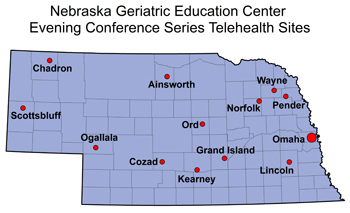 |
The NEBGEC seminars are presented a 12 sites across Nebraska via the university’s telehealth network. |
The Jan. 27 conference — part of an educational series hosted by the UNMC-based Nebraska Geriatric Education Center (NEBGEC) — was a component of a medical center effort to improve geriatric care around the state.
Based on the attendance in January and previous sessions, the demand for such events is strong throughout the state, said Jane Potter, M.D., professor and chief of the section of geriatrics and gerontology at UNMC and principal investigator of the Health Resources and Services Administration grant that funds the NEBGEC.
“We were overwhelmed with the reception we’ve gotten,” said Dr. Potter, who noted that 200 people came to the Durham Research Center Auditorium and an overflow crowd of 92 people watched the conference in Lincoln via the telehealth network.
The crowds have been composed of physicians, nurses, physical therapists, pharmacy professionals and other health care workers.
“Clearly Nebraska practitioners appear hungry for the interdisciplinary type of training related to care of the elderly that the NEBGEC offers,” said Pat Hageman, Ph.D., professor in the School of Allied Health Professions and director of the evening programs.
The NEBGEC annually hosts three evening conferences and one, two-day conference to help improve interdisciplinary geriatric care in Nebraska. This effort is particularly important as the state prepares to deal with an aging population with a shortage of health care workers.
“These activities allow us to present best practices in interdisciplinary geriatric care,” Dr. Potter said. “This is essential because geriatric care by its nature is an interdisciplinary endeavor.”
|
|
By attending all the evening conferences, the annual two-day event and a series of Web-based modules, participants can earn up to 80 contact hours in two years to complete a mini-fellowship in geriatric care.
Matt Timm, M.D., operates a geriatric clinic in Pender. He attended the Jan. 27 session as well as last summer’s two-day conference.
The interdisciplinary approach highlights elements of geriatric care he may not have thought of in his role as a physician, Dr. Timm said.
|
Kira Koch Larson — a therapist who counsels geriatric patients in Lexington — has attended several of the seminars and is working toward the mini-fellowship.
“As a counselor, I find this unique training to be very important because there is a growing need for more mental health services for senior adults,” Larson said.
Like Dr. Timm, Larson said she found the interdisciplinary approach useful.
“Each health care professional in the audience may be more orientated towards a team approach in treatment planning and care delivery since we are being educated in other disciplines, as well our own,” Larson said.
The turnout and response indicate that the program fills a vital need across the state, Dr. Hageman said, especially considering that the state’s aging population is particularly prominent in rural areas, which often lack health care workers.
“This program has really taken off and I think it’s excellent that UNMC is there to help meet this need,” Dr. Hageman said. “It truly is an example of how we help educate the state’s health care workforce.”